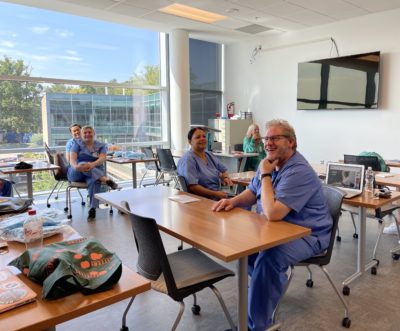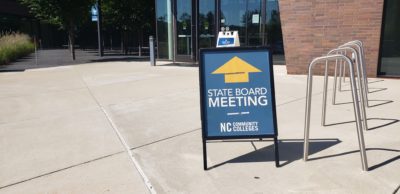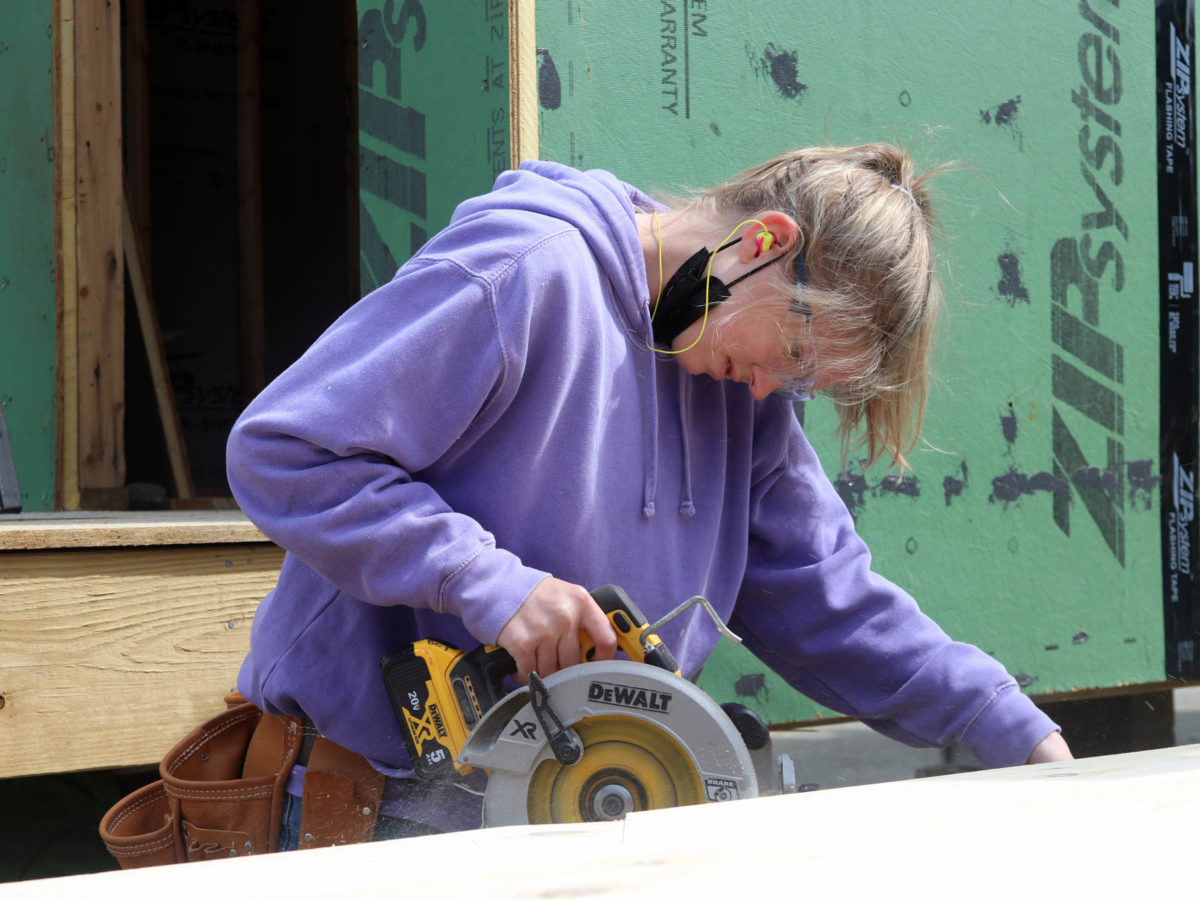
|
|
Grace Whittington was always fascinated with construction. Thinking back on it now, the 17-year-old can’t recall exactly how she got interested or why, but she has vivid memories of playing with Legos as a child and “doing stuff with wood,” even when she wasn’t old enough to do much with it. Then there was a cousin who would step in now and then, showing her how to use tools. Several years ago, they even built a bench together.
So when Grace reached her high school years as a home-schooled student, her mother Cindy started searching for the kind of opportunity many high schoolers take for granted: the chance to build. A place for Grace to pursue her interest and see if construction might be worth doing for the rest of her life.
But it didn’t take long for Cindy to hit a wall.
It started off well enough. There was a camp near the family home in Raleigh where Grace spent some time riding around with the maintenance crew. But then Cindy got a call saying the board wouldn’t allow Grace to be there alone with men. She was allowed to go into the shop now and then, but all she ended up doing was sorting nails. “I understand their intentions, but it was very frustrating,” Cindy says looking back. “I even told them, if she gets hurt, I won’t sue you, but they didn’t want to do that either. I wanted to get her involved in something before she was done with high school, to get a head start, but nobody was willing to teach her.”
Cindy kept reaching out to companies and nonprofits and anyone who might take her daughter on and give her a chance. But nobody seemed interested. The reasons sounded sincere enough: Some didn’t want Grace to get hurt using power tools and others didn’t feel comfortable with her being the only girl in a larger group. On the other hand, boys her age were easily sliding into the same kind of opportunities without a moment’s thought.
“They didn’t mean to be malicious,” Cindy says. “But I did feel like if it was my son who wanted to do that, it would not have been an issue.”
‘Women in Construction’
About the time things got pretty desperate, as Cindy describes it, she was talking with one of her son’s friends who was studying welding. So, Cindy posed the same old question, yet again: Do you know anyone who could teach Grace construction?
This time, there was a glimmer of hope. He told her about “Women in Construction,” a continuing education class being offered at Central Carolina Community College in Pittsboro, a 50-minute drive from their home. Mom researched the course online, emailed Building Construction Technology Lead Instructor Jeff Gannon and enrolled both of them on the spot.
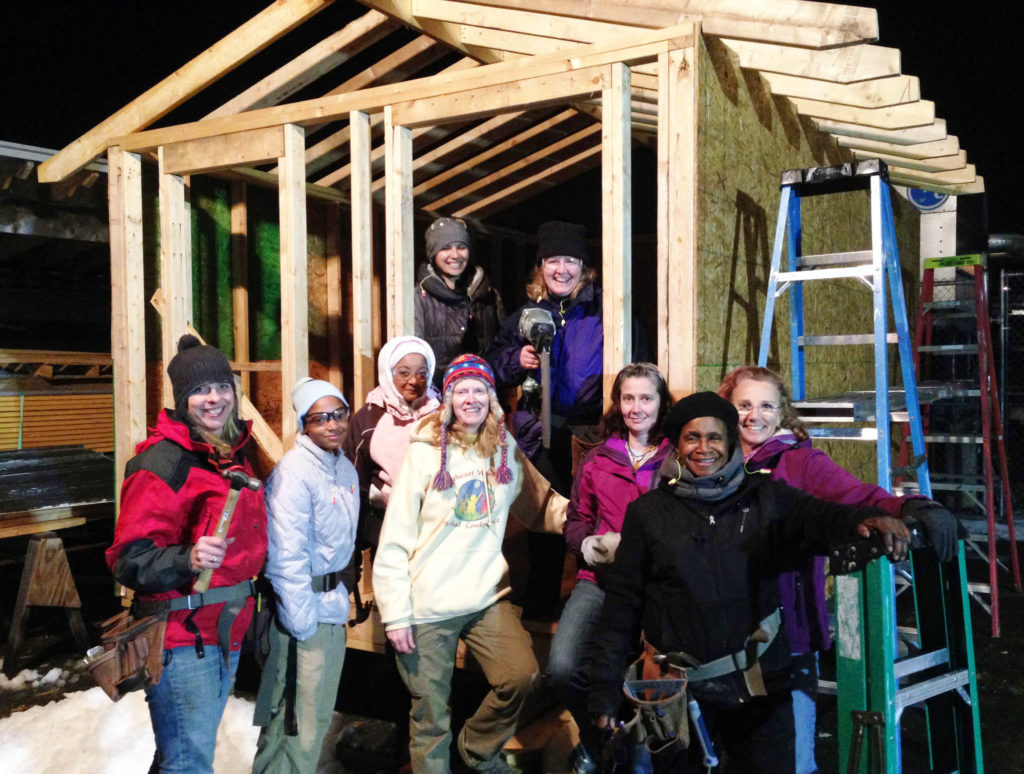
It was a decision that may have changed Grace’s life.
Gannon describes his evening Women in Construction class as “a fantastic hodgepodge” of students. A few, like Grace, are young and may be exploring a career in construction. Others are in their late 60s and taking the class simply because they’ve always been intrigued by construction and maybe want to try a few home improvement projects on their own. And, of course, there are all sorts of ages and interests in between.
Women in Construction teaches the basics — the official course description describes them as “fundamentals of residential construction including footings, foundations, floor, wall and roof framing systems,” all emphasizing a hands-on approach. Everything is structured around one major project: a student-built shed that is later sold at auction to raise money for the next class project.
For Grace, Women in Construction was such a big hit that she enrolled in the college curriculum program for academic credit, even while still completing high school, and is now a dual-enrollment student working toward the Associate in Applied Science. But she’s not waiting for graduation to launch her career. Last August, Grace registered her own business with the North Carolina Secretary of State, and on one Friday morning in April was busy in class, running up and down stairs, and cutting long pine boards with a circular saw. She was helping build a cottage, a larger project by construction students seeking academic credit, while wearing a light purple T-shirt emblazoned with her company name: Springwater Construction LLC.
Building a legacy
Grace certainly isn’t the first successful woman to develop her skills in CCCC’s Building Construction Technology program. As owner of A.Marie Design + Build based in Apex, Angela Cacace works as a carpenter, designer and contractor, performing high-end remodeling projects from concept through design and construction. She also is founder of Move Over Bob — initially a website, but, at this point, more of a worldwide movement — that highlights trailblazing women in construction. Its name alludes to Bob the Builder, the construction worker in a popular children’s television series, and Cacace says the outreach was created to build a much-needed sense of community for women entering a male-dominated industry. It was one important way to celebrate women who paved the way for others to overcome obstacles, enter the industry and succeed.
Her work even attracted the attention of The Washington Post Magazine, which highlighted Cacace in a 2019 feature, “Meet the New Wave of Female Builders,” that described how female builders across the nation were “responding to sexism and isolation by creating a community — and a future — for themselves.”
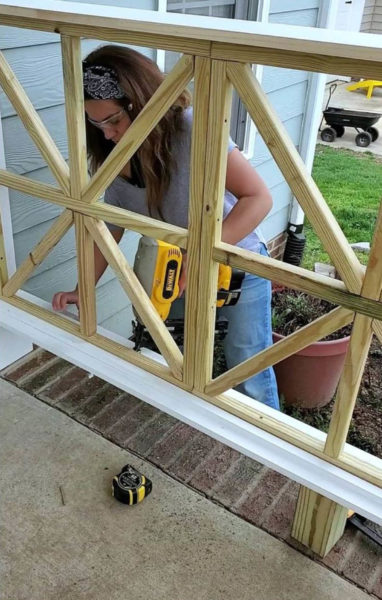
Cacace didn’t anticipate any of this when she walked into her first community college class. In fact, she had recently moved to North Carolina from Washington, where she worked as a barber, and was a little nervous about the new environment she was about to encounter. “It was a little intimidating, the idea of walking into a construction class,” she recalls. “I was really expecting to be the only woman there, but was very surprised to find five others.”
What she did encounter was “an awesome and diverse class” where students learned from Gannon as well as from each other. There was a sense of community among all of the students, she says, and that only intensified her interest in construction. If it weren’t for that kind of inclusive environment, things could quickly have moved in the wrong direction. “If I had a bad experience, I don’t know if I would have pursued it,” she says. “But I had a great experience. I learned a lot. Jeff is a phenomenal teacher and carries through after the class. I can still call or text him for advice and he’ll call back. That’s invaluable in so many ways.”
Ahead of the curve
None of this happened by chance. CCCC began a Women in Construction continuing education course, which was a way for women to test the waters. Gannon understood that many were worried about working in a men-dominated industry. Gannon also saw women successfully breaking into the business and celebrated that as a good thing, an advancement that not only bolstered the construction workforce, but refreshed the industry with new perspectives and possibilities.
Now, it seems like CCCC has been ahead of the curve and the world is just now starting to catch up. According to the U.S. Bureau of Labor Statistics, women made up about 10.9% of the overall construction workforce when the most recent data were published for 2020, a proportion that includes office jobs as well as trades workers. That figure remained stagnant for the longest time but has just started to inch up and may be headed even higher.
Ironically, the reason may be the pandemic.
Anne Pfleger is national president for the National Association of Women in Construction, a trade organization based in Texas with 115 chapters throughout the United States working to draw more women into the industry and provide what they need for success on the job. Pfleger said public health concerns and social shifts over the last year have suddenly caused companies to become very interested in some of the reforms her organization has advocated all along to draw more women into construction. Reforms like providing proper sanitation and personal protective equipment (PPE) on work sites, allowing for flexible work schedules, and eliminating harassment and bullying on the job — all issues of particular concern for women, but changes that improve working conditions for everyone.
“Sanitation and proper PPE, that’s beginning to happen,” Pfleger says. “Where we need more support is stopping harassment and bullying. That’s still, unfortunately, something that happens and it’s just now recently that more and more women are stepping forward to tell their stories. Women are finally feeling like they can go talk to someone without backlash.”
Those national trends are certainly good news for drawing more women into the industry. The question is whether those pandemic-inspired gains will continue even after the public health threat subsides. Pfleger believes they will. “I think it’s going to get the ball moving and it’s going to continue to grow,” she says. “It’s growing even quicker than we anticipated. It’s been so very slow over the last 10, even 20, years but we’re finally making that headway. With the way people are paying attention to diversity, equality, and inclusion, that’s something that’s not going to go away.”
‘An answer to prayer’
The prospect that more women will be entering construction is great news for Gannon and CCCC Building Construction Technology. The college is making it happen, one student at a time.
When Grace decided she wanted to enroll in the degree program while still a home-schooler, CCCC officials created a career pathway that allowed her to take college courses before high school graduation. And when potential clients started contacting Grace about paid work, Gannon stepped in to provide business advice and help her connect with an insurance company that was willing to write a policy for an especially young woman just entering the industry.
Grace’s most recent client was Millie Brobston, someone who is more than just a client. The two met in the Women in Construction class and hit it off. So, when Brobston was the high bidder on their class project, she hired Grace to build a deck for her brand-new shed. Brobston is one of the students who wanted to learn how to do things around her own home. With an unfinished garage that could use some windows, flooring and insulation, she headed to CCCC to get the expertise she needed to handle it all herself. What she got was not only some construction skills, but some wonderful memories. And friends like Grace.
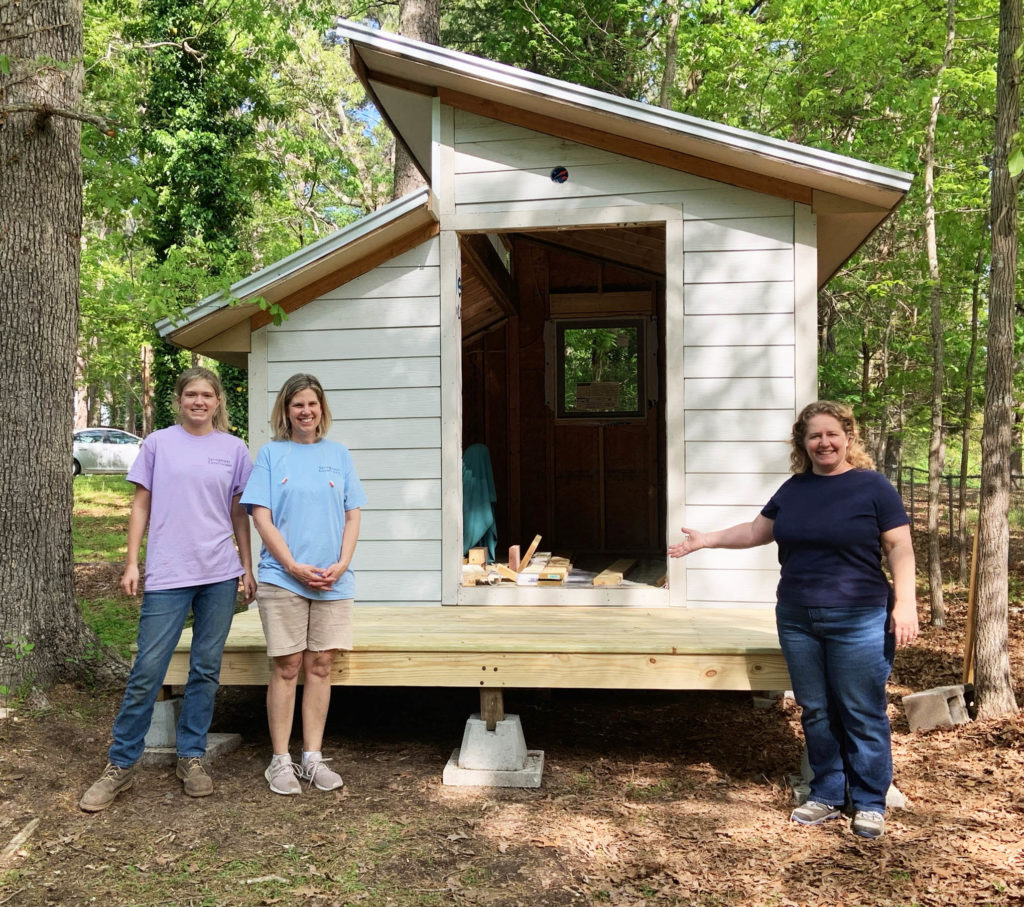
Brobston says it’s important to have a construction class for women because it gives them the safe space to express anxiety when trying something new and potentially dangerous for the very first time — or to admit they’re not really sure what to do in some new situation and be willing to seek advice. It helps, she said, to feel the support of other women.
Even someone as successful as Cacace agrees, saying it’s a big deal for women to have a safe space to take on such a huge challenge. The proof, she says, is in the enrollment: “The fact that they could even hold Women in Construction classes says something about how there are enough women interested to have that class at all.”
What Gannon and the college has built at CCCC is already having an impact on the local construction industry and beyond. But what matters to him even more is the impact the program is having on individual lives. The opportunity for students to follow their dreams, even in a field where they don’t see many people like themselves. Or the ability to do intrinsically rewarding work on their own homes. Based on the assessment of his students, it seems like a success so far for everyone involved — the college, the women, and the instructor who brought it all together.
“I really cannot say enough about the impact that he has had on both of us,” Cindy wrote about Gannon in a followup about their experience. “Grace and I were both starting to get really discouraged about how to help her learn this trade when we met him. His willingness to not only teach her when she was just 16, but to use his position at the school to create a pathway for her to start her education, has really been an answer to prayer.”
To learn more about the Central Carolina Community College Building Construction Technology program, click here.
Recommended reading
